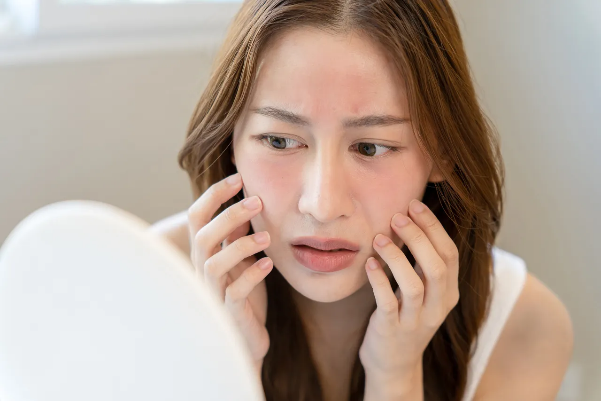What is sensitive skin?
Common signs include redness, itching, stinging, or dryness after using cosmetics, some skincare products, or when exposed to environmental factors.
Age, hormonal changes, and stress can also affect skin sensitivity.
Sensitive skin can also be a symptom of underlying conditions or medication side effects.

How to choose skincare products for sensitive skin?
One of the best ways to prevent sensitive skin is to choose skincare products specifically made for sensitive skin. These products should provide a balance between enhancing skin health.
– Avoid products that contain parabens, phthalates, lactic acid, sulfates, alcohol, essential oils…
– Do not use scented skincare products with strong fragrances as they often contain powerful chemicals that can further irritate the skin.
In the long run, these chemicals can deplete the natural oils on the skin, leading to dryness and increasing the risk of redness, irritation, and inflammation. Limiting the use of products with these ingredients can minimize the risk of skin irritation.
– The skincare products to choose should contain soothing ingredients for the skin such as aloe vera, shea butter, coconut oil, hyaluronic acid, chamomile, sunflower seed oil, and vitamin E.

– Sunscreen is an essential part of daily skincare routine. However, if you have sensitive skin, you should avoid chemical sunscreens that may contain ingredients such as avobenzone, octinoxate, and oxybenzone.
Some reactions can be mild, while others can be more severe. If you experience any unusual reactions, seek medical advice from an allergist and/or dermatologist.
– Eat antioxidant-rich foods, such as leafy greens, can help reduce inflammation, while spicy foods, alcohol, and caffeine can exacerbate skin issues.
– Aim to get at least 7-8 hours of sleep every night for optimal skin health. Hot baths and prolonged bathing can be relaxing but can damage sensitive skin.
– Choose cotton clothing as they are lightweight, soft, and allow the skin to breathe. Avoid choosing wool or rough fabrics as they can cause irritation, itching, and increase the risk of allergies.





































